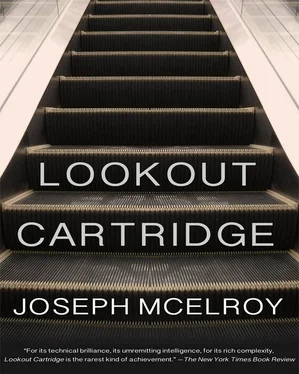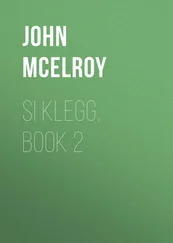Joseph McElroy - Lookout Cartridge
Здесь есть возможность читать онлайн «Joseph McElroy - Lookout Cartridge» весь текст электронной книги совершенно бесплатно (целиком полную версию без сокращений). В некоторых случаях можно слушать аудио, скачать через торрент в формате fb2 и присутствует краткое содержание. Год выпуска: 2014, ISBN: 2014, Издательство: Dzanc Books, Жанр: Современная проза, на английском языке. Описание произведения, (предисловие) а так же отзывы посетителей доступны на портале библиотеки ЛибКат.
- Название:Lookout Cartridge
- Автор:
- Издательство:Dzanc Books
- Жанр:
- Год:2014
- ISBN:9781941088036
- Рейтинг книги:3 / 5. Голосов: 1
-
Избранное:Добавить в избранное
- Отзывы:
-
Ваша оценка:
- 60
- 1
- 2
- 3
- 4
- 5
Lookout Cartridge: краткое содержание, описание и аннотация
Предлагаем к чтению аннотацию, описание, краткое содержание или предисловие (зависит от того, что написал сам автор книги «Lookout Cartridge»). Если вы не нашли необходимую информацию о книге — напишите в комментариях, мы постараемся отыскать её.
Lookout Cartridge — читать онлайн бесплатно полную книгу (весь текст) целиком
Ниже представлен текст книги, разбитый по страницам. Система сохранения места последней прочитанной страницы, позволяет с удобством читать онлайн бесплатно книгу «Lookout Cartridge», без необходимости каждый раз заново искать на чём Вы остановились. Поставьте закладку, и сможете в любой момент перейти на страницу, на которой закончили чтение.
Интервал:
Закладка:
But then I looked, and there were two new ones up. One was very likely of the red-haired woman, though the hair had been left unpainted. What you had was face and shoulders, neck and breast, predominating pale peach and silver-mauve, with the hair left the plain underpainted white that had been laid on the canvas. I felt that this was an abstract, a kind of wildly energetic abstract — I think I really don’t know about these things; I hear a bit from Geoff Millan, but he prefers to talk to me about liquid crystals or West End plays I haven’t seen. The peculiar thing here was I was simply seeing the face, no problem, as if the displacements and the riding, shedding planes of the work that made the flesh look like it was undressing didn’t exist. Now this was a switch, at least for the likes of me. Also, I wanted to sit down on the girl’s desk and tell her.
Instead I asked if in real life that woman had red hair.
The girl shrugged: In weal life? I mean, it’s a work of art.
I said it might be a good likeness.
I was wondering if anyone was in the back room where through a door I saw bigger canvases leaning up against white walls.
I said I guessed leaving the hair unpainted made the picture art.
The girl smiled.
I asked Jan Graf’s address and phone, the girl wouldn’t give it out. She said if I was interested in buying, she would take my name. The artist would be in Wednesday.
I asked when the girl herself came to work. It wasn’t as if I’d invited her to breakfast, but she didn’t like my asking and said, When we open. I felt I was losing something and could get something else better only if I took advantage of being in New York and London at the same time or if I started asking the girl some wonderful questions: like, Is there an insurance group prepared to write a policy to cover the theft even of the carbon copy of my film diary that’s hidden in Jenny’s cupboard? What are the dimensions of such a carbon copy and would those dimensions fit into a lookout cartridge? But these questions are like the dreams I envision when waking but then don’t have sleeping. On the 271 from Highgate Village to Holloway Road tube station after lunch with Lorna — some very hot and good leftover curry — I had imagined having such a dream some night soon, imagined perhaps in order to forestall. For the familiarity of that route had obviated my looking at it except the marquee of the ABC cinema and instead I envisioned having a nightmare in which I challenged Outer Film to a public audit. Phil Aut in an Aquascutum Super Burberry with silk labels streaming out of the tailored pockets lay on an exercise couch waterbed that was just water and dreamily asked the audit to proceed and the audit was of my film record and then many carbons, and with each new carbon the price rose until I couldn’t pay and Phil Aut said we still had not found who was responsible for destroying the film but we might try another carbon.
Instead of wonderful questions like forestalled dreams, I asked the gallery girl if she knew Jenny Cartwright.
When she said this wasn’t American Express, I said would she pass on a message from Jenny to Reid.
There was an alertness in the way she said Reid?
You know Reid, I said.
She had work to do now.
She got up.
I said, Will you take a message from someone you don’t know to someone you do? From Jenny to Reid, it’s this: there’s a carbon of the film diary in her cupboard.
She backed away, got out from behind her desk, side-stepped toward the door to the back room.
Might I use her phone?
She said no. Then she said in a different measured tone that if I saw Reid, someone had been trying to phone him here and would he stop giving this number.
I said I was not in touch with Reid; sorry.
I preferred that Lorna not hear my call, so before returning home I found a kiosk. Cosmo wouldn’t be in my address book, but my address book was back at Sub’s. Now the third of the four London phone directories was missing that in the alphabetical sequence contained Cosmo’s name. I was close to the Knightsbridge bed-and-breakfast hotel where Lorna didn’t know I’d spent last night — long after she’d perhaps prepared that curry for the second tenor. The hotel would have all four phone books. But as I pushed open the glass door of my kiosk I recalled Cosmo’s number — pure accident.
He said he’d got my card and Dagger had told him who Claire was but he didn’t understand why she would want to know where I’d seen Krish.
Then Cosmo didn’t say anything. After all we are not friends, he knows me only through Dagger and perhaps I don’t like Cosmo.
He said, Yeah well.
I said, What are you doing?
He waited, maybe thinking. Then he said, Just sitting.
I said, I’m off to New York tonight.
He said, That’s your line, man.
I got back to Highgate and Lorna wasn’t home. Will wouldn’t be home from school. I got into the garden along a walk past our black plastic dustbins. The Joni Mitchell Blue was in the Knightsbridge B & B. I was three miles or whatever it was away now. London is so large. It is as long as a life. Cosmo had been just sitting, probably reading the sports in the Paris Herald . He would phone his sinister Indian friend Krish who must know already I was in London. Say Krish was the one who’d ruined our film, what if I never found out why? But what if I did? If I did I could blow the whistle. But why?
Maybe Cosmo was just, as he said, sitting.
There are times when your sense of being between here and there, between people, between one thing and another, fades not even into absurdity but into something else, death or revelation, more likely death, as you sense that whatever they are (whom you are or were between), they are not near after all, not holding, don’t know you, or just don’t know.
The only ground-floor window that I could see from outside wasn’t locked was in full view of the back of the house of one of our neighbors who had complained about the tortoise. It was not locked, but it was a while before I could ram it upward so my old paint-job unstuck.
Minutes it took me. The window was narrow, so rather than dive into this storeroom I got myself slowly around in order to lower my feet to the floor, and this took more minutes. The room was dark but even so I felt the long but now surely shortening twilight on its way. But it was really too early for it; furthermore, in New York, where my body clock perhaps still slowly turned inside my suitcase that Lorna had slowly packed the other night while Jenny and I argued, it was hardly 10 A.M. Maybe I should just sit. Maybe that was what Phil Aut was doing right now.
Jenny’s cupboard smelled of her perspiration and soap. It was the first time I’d been upstairs since being home. There was an American science-fiction book on the floor. I was sitting on Jenny’s bed checking the pages of my carbon when I heard the door downstairs.
The Mick Jagger poster was slowly coming down over her mantel; a corner was loose like a film wipe peeling a pale fold over the bright brow and toward one eye, the face Rembrandt-bright among the black, brown, blue, and purple of night and clothing, though split and lighted by bits and stripes of ornament that at a glance might as well have been in the audience or low on the sky horizon as on the singer’s shirt and pants. I found I hated him and I tried to control this only to find that I hated him for giving concerts in America.
The gray suitcase Jenny’s fingers had slowly packed for our film stood before the unplugged electric heater rather than in her cupboard where she usually kept it. If I had seventeen carbons of the film diary it would be satisfying to pack them in this suitcase for my getaway.
Читать дальшеИнтервал:
Закладка:
Похожие книги на «Lookout Cartridge»
Представляем Вашему вниманию похожие книги на «Lookout Cartridge» списком для выбора. Мы отобрали схожую по названию и смыслу литературу в надежде предоставить читателям больше вариантов отыскать новые, интересные, ещё непрочитанные произведения.
Обсуждение, отзывы о книге «Lookout Cartridge» и просто собственные мнения читателей. Оставьте ваши комментарии, напишите, что Вы думаете о произведении, его смысле или главных героях. Укажите что конкретно понравилось, а что нет, и почему Вы так считаете.












